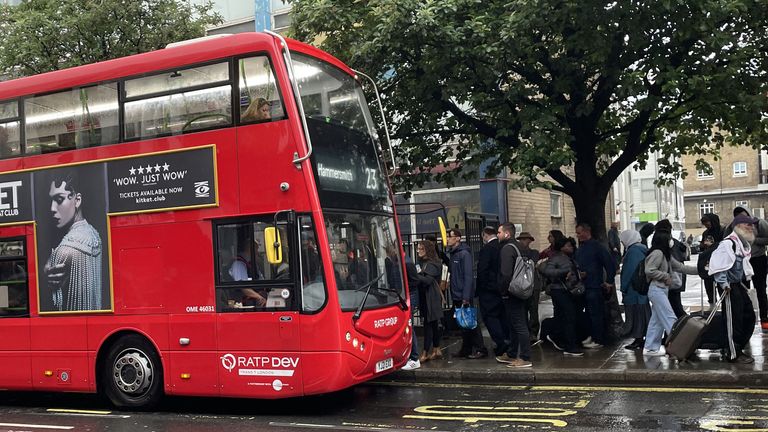Tube workers in London will strike next month in a dispute over pay, two unions have announced.
The strikes will take place from 1 to 16 November after members of both ASLEF, the train drivers’ union, and the RMT, representing most other Tube workers, rejected a pay offer from Transport for London (TfL).
London Underground drivers, instructors, managers, and engineers who are ASLEF members will strike across four days between 1 and 16 November.
They will also not work any overtime on different days, depending on their jobs.
Follow latest politics updates
Maintenance and engineering staff, controllers, emergency responders, signallers and fleet and engineering staff who are members of the RMT union will also strike on various days between 1 and 8 November.
• Engineering drivers and maintenance staff will strike on 1 and 2 November – with no overtime until 8 November
• Track access controllers, control centre staff will strike from 6.59pm on 3 November to 6.59pm on 4 November
• Emergency response unit staff will strike all day on 4 November
• Fleet, engineering, stations and trains staff will strike all day on 5 November
• Signallers and service controllers will strike all day on 6 November
• Train drivers, instructors, and managers will strike on 7 and 12 November
• Managers will not work any overtime on 3 and 16 November
• Engineering drivers will be on an overtime ban on 1 and 8 November.
ASLEF members voted overwhelmingly for the action, with 98.8% wanting strike action, with a 68% turnout.
Finn Brennan, ASLEF’s London Underground organiser, said: “We don’t want to go on strike – we don’t want to make travelling in and around the capital more difficult for passengers and we don’t want to lose a day’s pay – but we have been forced into this position because London Underground management won’t sit down properly and negotiate with us.”
He said Transport for London’s (TfL) pay offer of 3.8% plus a variable lump sum “means Underground drivers will stay on a lower salary than drivers on other TfL services while working longer hours”.
Tube drivers will also receive a lower pay rise than other Underground workers, he added.
ASLEF said TfL management has refused to discuss key issues, including reducing the working week and introducing paid meal times to bring drivers in line with those working on the Elizabeth line and London Overground.
RMT general secretary Mick Lynch said TfL’s pay offer “falls short of what our members deserve” and said it would push staff into pay bands solely decided by management, which “undermines our members’ rights and the core principles of fair negotiation”.
“No trade union can accept any pay proposal where management decide which of our members gets a pay rise and those who do not,” he added.
“We remain open to negotiations, but London Underground must come back to the table with a comprehensive, consolidated offer that respects the rights of all our members. Until then, our industrial action will continue as planned.”
A spokesman for Mayor of London Sadiq Khan said: “Nobody wants to see strike action or disruption for Londoners.
“The mayor urges ASLEF and TfL to work together to avoid this industrial action.”
Tube strikes have become a part of life in the capital, with commuters and tourists forced to use buses and taxis, cycle, walk or drive during walkouts, often bringing London’s traffic to a halt.
The last strikes happened in January, when members of the RMT walked out for five days over a below-inflation pay increase of 5%.


